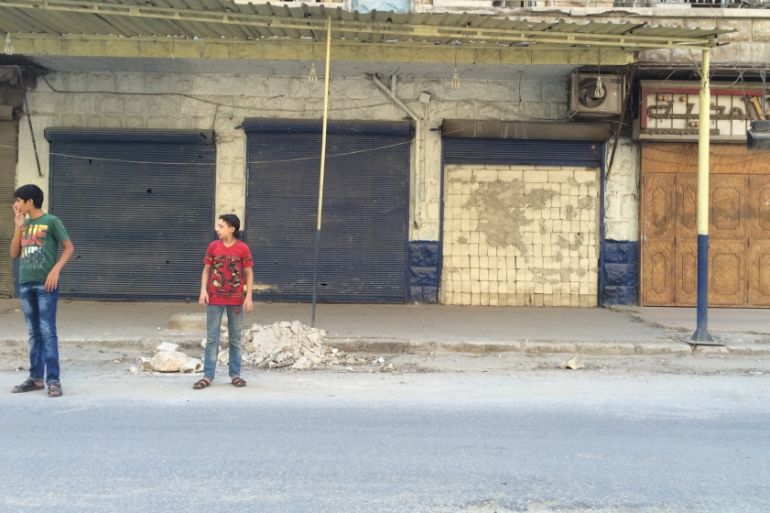Syria war: Aleppo’s civilians face humanitarian crisis
Residents and activists in Syrian city say supplies are scarce and aerial bombardment of civilian areas is unrelenting.

The humanitarian situation has gravely deteriorated in Syria’s northern city of Aleppo where Syrian government forces and Russian warplanes continue to attack civilian neighbourhoods, according to activists and residents.
“In the last four days, food supplies have close to disappeared from the markets, and prices have skyrocketed,” Salem al-Atrash, a resident in the city, told Al Jazeera on Tuesday.
“You can only rarely find anyone on the streets, because of the intensity of the indiscriminate and barbaric shelling of the Russian and Syrian armies,” he said.
Once Syria’s largest city, Aleppo has been divided between opposition control in the eastern half and government control in the west since mid-2012.
READ MORE: Civilian deaths mount after Syrian regime loses ground
Government troops loyal to President Bashar al-Assad launched an offensive to retake the rebel-held half of the city, imposing a month-long siege that was eventually broken by opposition forces in early August.
Since the end of the siege, unprecedented numbers of civilians have been killed daily by aerial bombardment on the city.
According to the Local Coordination Committees (LCC), a grassroots network of activists across Syria, at least 90 have been killed since Sunday, and more than 200 were recorded dead last week.
“There are always six planes in the sky – four helicopters and two warplanes – for 24 hours a day. There has been no pause in the shelling at all,” said Atrash, who lives in Aleppo with his wife and three children.
‘Apex of horror’
Addressing the UN Security Council on Monday, Stephen O’Brien, the UN secretary-general for humanitarian affairs and emergency relief coordinator, said: “Aleppo has become the apex of horror at its most horrific extent” for the people suffering in the city.
“I have underscored that up to 275,000 people in eastern Aleppo have been almost entirely cut off from vital supplies, including food, water, medicine, and electricity, for over a month,” he added.
Aleppo’s residents are “living in constant fear of total besiegement”, O’Brien said, while “access also remains extremely difficult to the estimated 1.5 million people in western parts of the city.”
![Food and other essential supplies have become scarce in the city [Zouhir al-Shimale/Al Jazeera]](/wp-content/uploads/2016/08/5818027b66214805989978ce2d2ecf73_18.jpeg)
Activists on the ground say the the escalation in aerial bombardment has followed the Assad regime’s loss of significant strategic territory in the city.
A coalition of rebels, calling themselves the Army of Conquest, claimed to have captured a military base as well as an armament school and an artillery school in the Ramosa quarter of Aleppo earlier this month. The rebels reportedly then used the captured base to launch their offensive to break the regime’s siege of Aleppo.
READ MORE: Syrian opposition says rebels break siege of Aleppo
Ibrahim al-Hajj, media centre director in Aleppo for the Syrian Civil Defence, a volunteer rescue group also known as the White Helmets, said civilian infrastructure was increasingly under attack.
|
|
“Field hospitals, ambulance and civil defence personnel have been targeted the most in the last few days, especially with cluster bombs,” Hajj told Al Jazeera.
“There’s very little movement in the streets. It’s as though Aleppo is besieged again,” Hajj said.
Despite the breaking of the siege, activists say the regime has advanced towards Ramosa, which is one of the main routes that residents in the eastern half of the city are using to flee.
Although some have managed to get out of the city, others understand “the risk associated with trying to leave, and decided to stay,” Atrash said.
“There are also families like ours who believe that we do not want to lose our land. We are attached to our country,” he added.